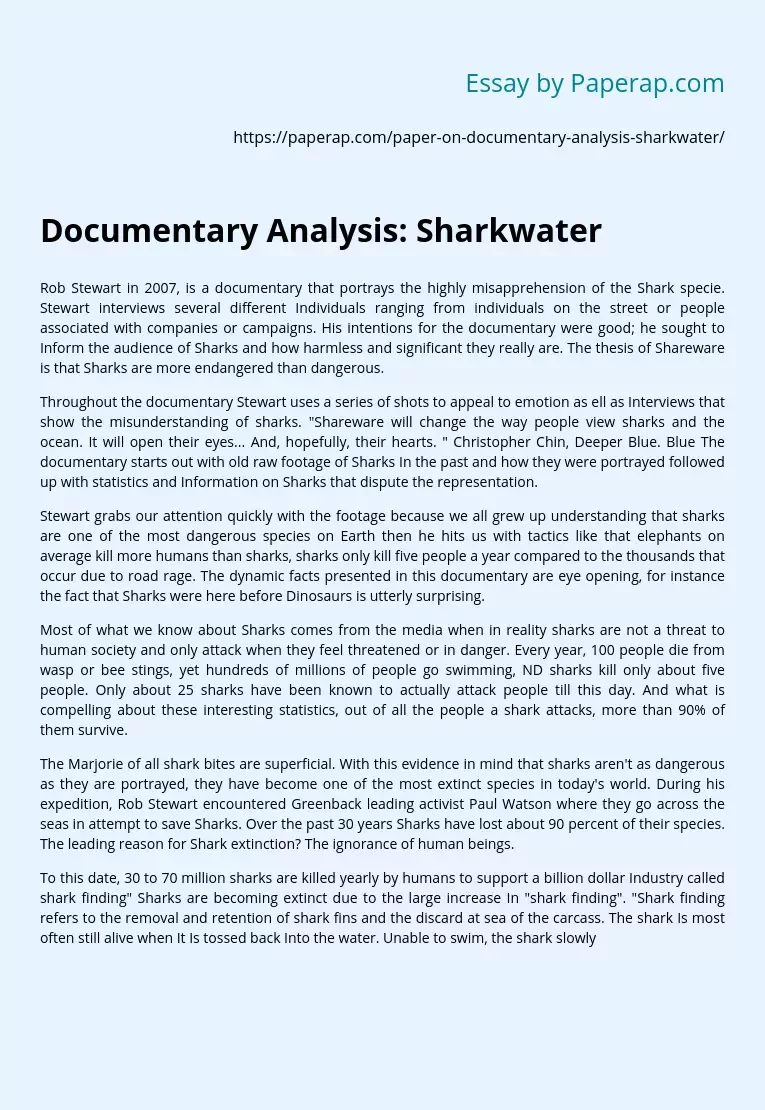Documentary Analysis: Sharkwater
Rob Stewart in 2007, is a documentary that portrays the highly misapprehension of the Shark specie. Stewart interviews several different Individuals ranging from individuals on the street or people associated with companies or campaigns. His intentions for the documentary were good; he sought to Inform the audience of Sharks and how harmless and significant they really are. The thesis of Shareware is that Sharks are more endangered than dangerous.
Throughout the documentary Stewart uses a series of shots to appeal to emotion as ell as Interviews that show the misunderstanding of sharks.
“Shareware will change the way people view sharks and the ocean. It will open their eyes… And, hopefully, their hearts. ” Christopher Chin, Deeper Blue. Blue The documentary starts out with old raw footage of Sharks In the past and how they were portrayed followed up with statistics and Information on Sharks that dispute the representation.
Stewart grabs our attention quickly with the footage because we all grew up understanding that sharks are one of the most dangerous species on Earth then he hits us with tactics like that elephants on average kill more humans than sharks, sharks only kill five people a year compared to the thousands that occur due to road rage.
The dynamic facts presented in this documentary are eye opening, for instance the fact that Sharks were here before Dinosaurs is utterly surprising.
Most of what we know about Sharks comes from the media when in reality sharks are not a threat to human society and only attack when they feel threatened or in danger.
Every year, 100 people die from wasp or bee stings, yet hundreds of millions of people go swimming, ND sharks kill only about five people. Only about 25 sharks have been known to actually attack people till this day. And what is compelling about these interesting statistics, out of all the people a shark attacks, more than 90% of them survive.
The Marjorie of all shark bites are superficial. With this evidence in mind that sharks aren’t as dangerous as they are portrayed, they have become one of the most extinct species in today’s world. During his expedition, Rob Stewart encountered Greenback leading activist Paul Watson where they go across the seas in attempt to save Sharks. Over the past 30 years Sharks have lost about 90 percent of their species. The leading reason for Shark extinction? The ignorance of human beings.
To this date, 30 to 70 million sharks are killed yearly by humans to support a billion dollar Industry called shark finding” Sharks are becoming extinct due to the large increase In “shark finding”. “Shark finding refers to the removal and retention of shark fins and the discard at sea of the carcass. The shark Is most often still alive when It Is tossed back Into the water. Unable to swim, the shark slowly sinks toward the bottom where It Is eaten alive by other fish. ” Shark finding Is widespread, and largely unmanaged and unmonitored.
Shark fin Is a popular delicacy In Salsa especially China, where It Is usually served In shark fin soup weddings, business dinners, and other celebrations. Shark fin soup can cost up to $120 per bowl. The Illegal finding of sharks resort from the large profit It succumbs. Shark telling Is the second biggest profitable Illegal way to make money only behind drug trafficking. Sharks fins are used In soup internationally as it is a symbol of wealth. One pound of dried shark fin can retail for quinine used to fin sharks stems from a process called “long lining”.
Long lining fishing is taking a large fishing line usually filled with infotainment that stretches anywhere from a mile to 62 miles long and attaching it with hundreds of baiting hooks. Once captured, the crew cuts off their fins and dumps the rest of the animal back into the ocean, often still alive and unable to swim. Shark finding is illegal in many countries but still it continues to occur. And there is no regulation that protects sharks so they will continue to go endangered until society does something about it.
Documentary Analysis: Sharkwater. (2017, Nov 05). Retrieved from https://paperap.com/paper-on-documentary-analysis-sharkwater/

